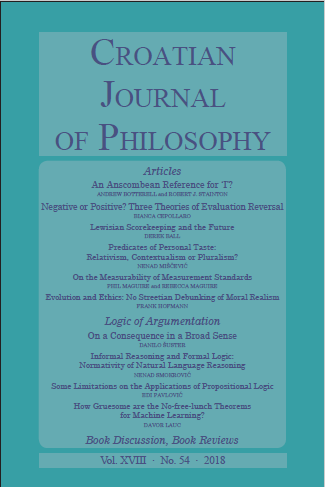On a Consequence in a Broad Sense
On a Consequence in a Broad Sense
Author(s): Danilo ŠusterSubject(s): Epistemology, Logic
Published by: KruZak
Keywords: Informal logic; consequence; begging the question; cogency; deductivism; counterexample;
Summary/Abstract: Cogency is the central normative concept of informal logic. But it is a loose evaluative concept and I argue that a generic notion covering all of the qualities of a well-reasoned argument is the most plausible conception. It is best captured by the standard RSA criterion: in a good argument acceptable (A) and relevant (R) premises provide sufficient (S) grounds for the conclusion. Logical qualities in a broad sense are affected by the epistemic qualities of the premises and “consequence” in a broad sense exhibits an interplay of form and content. There are four proposals for the premise—conclusion relation: (i) no strictly logical connection (“non-logical” consequence); (ii) one type of connection only (deductivism); (iii) a few types of connection (deduction, induction, perhaps conduction and analogical reasoning); (iv) many types of connection (argumentation schemes). Deductivism is a serious option but in its strong version, as the discussion about petitio shows, it fails to establish that arguments which are not cogent are thereby invalid. And weak deductivism, very attractive from the pedagogical point of view, has some deficiencies (implausible hidden premises; preservation of truth, not probability). I argue that the idea of a counterexample, when we regard certain components of the argument as fixed and others as variable, is the best approach to the analysis of the illative core of every-day arguments (the approach of David Hitchcock on material consequence).
Journal: Croatian Journal of Philosophy
- Issue Year: XVIII/2018
- Issue No: 54
- Page Range: 433-453
- Page Count: 21
- Language: English
- Content File-PDF

